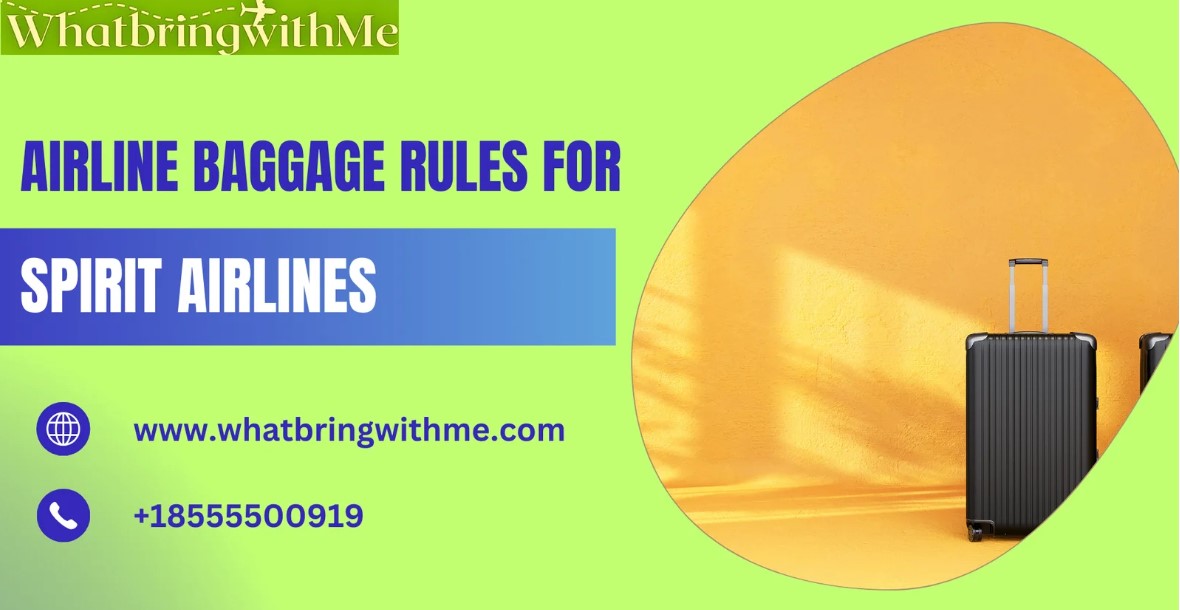Spirit Airlines, known for its budget-friendly fares, offers travelers the opportunity to save money by only paying for the services they need, including baggage. However, navigating airline baggage rules for Spirit Airlines can be a bit tricky, especially if you're not familiar with their policies. Understanding these rules in advance can help you avoid unexpected fees and make your journey smoother. Here's a comprehensive overview of Spirit Airlines' baggage rules as of 2024.
1. Carry-On Baggage
Spirit Airlines offers different options for carry-on baggage, and knowing what’s allowed can save you money.
- Personal Item: All passengers are allowed one personal item free of charge. This can include items like a small backpack, purse, or laptop bag. A personal item may not be larger than 18 x 14 x 8 inches (45 x 35 x 20 cm). Under the seat in front of you, it must fit.
- Carry-On Bag: If you need to bring more than just a personal item, you’ll need to pay for a carry-on bag. A carry-on bag's maximum measurements, including handles and wheels, are 22 x 18 x 10 inches (56 x 46 x 25 cm). The overhead bin must accommodate the carry-on bag. Spirit Airlines’ fees for carry-on bags vary depending on when you purchase the allowance – it’s generally cheaper to pay for your carry-on during booking or online before arriving at the airport.
2. Checked Baggage
Checked baggage on Spirit Airlines is not included in the base fare and must be purchased separately. The airline offers different pricing tiers based on when and where you purchase the baggage allowance.
- Checked Bag Allowance: Passengers can check up to five bags, with each bag subject to a fee. The maximum weight for each checked bag is 40 pounds (18 kg), which is lower than the typical 50-pound limit on most airlines. The maximum linear dimensions (length + width + height) for a checked bag are 62 inches (158 cm).
- Checked Baggage Fees: Similar to carry-on fees, the cost of checking a bag with Spirit Airlines depends on when and how you pay. It’s cheapest to pay for checked baggage during the initial booking process, with higher fees at the airport.If your bag is heavier over the permitted weight or size, you will be charged extra.For overweight bags (41-50 pounds), the fee increases, and even higher charges apply for bags weighing between 51-100 pounds. Oversized bags (over 62 inches) also incur additional fees.
3. Baggage Fees and How to Save
Spirit Airlines is known for its à la carte pricing model, which allows passengers to customize their travel experience by only paying for what they use. However, this can lead to higher costs if you're not careful. Here are some tips for saving on baggage fees:
- Pay Early: The earlier you pay for your baggage, the less you’ll spend. Adding baggage during booking is the cheapest option, followed by paying for it online before your flight. Waiting until you’re at the airport will result in the highest fees.
- Weigh Your Bags at Home: To avoid overweight baggage fees, weigh your bags at home before heading to the airport. Recall that Spirit has a 40-pound weight limit for checked baggage as opposed to other airlines' 50 pounds.
- Pack Light: If possible, try to fit everything into your personal item. Since this is free, it’s the best way to avoid paying any baggage fees. Be sure to check the dimensions carefully to ensure your bag qualifies as a personal item.
4. Special Items and Oversized Baggage
If you’re traveling with special items like sports equipment, musical instruments, or large bags, Spirit Airlines has specific policies and fees:
- Sports Equipment: Items such as golf clubs, skis, or fishing equipment can be checked, but they are subject to the same size and weight restrictions as regular checked baggage. If your equipment exceeds these limits, you’ll need to pay oversized or overweight fees.
- Musical Instruments: Smaller instruments that fit within the carry-on dimensions can be taken on board. Larger instruments must be checked, and they may incur additional fees if they are oversized or overweight.
- Oversized Bags: Bags that exceed the 62-inch linear dimension limit will incur additional fees. Spirit Airlines may not accept bags larger than 80 linear inches, so it’s essential to check the size of your luggage before heading to the airport.
5. Baggage Policies for International Flights
Spirit Airlines’ baggage policies are similar for domestic and international flights, but there are a few differences:
- International Checked Baggage Fees: For some international destinations, the fees for checked baggage may be higher than for domestic flights. It’s important to check the specific fees for your route before traveling.
- Customs Regulations: When flying internationally, be aware of customs regulations regarding what you can and cannot bring into another country. Certain items may be prohibited, restricted, or subject to duties and taxes.
6. Understanding Spirit’s Bare Fare Concept
Spirit Airlines operates on a “Bare Fare” concept, meaning that the base fare only covers the cost of your seat and one personal item. Everything else, including carry-on bags, checked bags, seat selection, and onboard refreshments, costs extra. This model allows travelers to save money by only paying for the services they use, but it also means that careful planning is necessary to avoid unexpected fees.
Conclusion
Navigating airline baggage rules for Spirit Airlines requires a bit of planning, but understanding these policies can help you avoid unnecessary costs and make your travel experience smoother. Whether you’re traveling light with just a personal item or bringing along multiple bags, being aware of the size, weight, and fee structure is key. Always remember to pay for baggage allowances as early as possible to save money, and consider weighing your bags at home to avoid extra charges at the airport. With a little preparation, you can make the most of Spirit Airlines’ budget-friendly fares without any surprises.





Comments